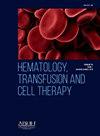来源受限的弥漫性大细胞淋巴瘤
IF 1.6
Q3 HEMATOLOGY
引用次数: 0
摘要
非霍奇金淋巴瘤(NHL)包括一系列起源于淋巴系统的血癌,弥漫性大b细胞淋巴瘤(DLBCL)是最常见的类型。在科索沃这个医疗资源有限的国家,管理非霍奇金淋巴瘤仍然是一个重大挑战。2024年,科索沃报告了60例淋巴瘤,其中53例被归类为NHL, 24例被确定为DLBCL。医疗保健系统面临着许多障碍,特别是在提供专业治疗方面,如骨髓移植(BMT),这在国内是无法获得的。这些限制影响了DLBCL患者的诊断、治疗和预后。目的本研究旨在探讨科索沃NHL病例中DLBCL的患病率,确定有限资源带来的医疗挑战,并强调骨髓移植作为淋巴瘤治疗的一部分不可用的关键问题。方法科索沃国家癌症登记处2024年的数据显示,60例淋巴瘤病例中,53例为NHL, 24例为DLBCL。本回顾性研究评估了这些患者的诊断、治疗和随访数据,重点关注治疗DLBCL的挑战,特别是缺乏骨髓移植服务。科索沃的医疗保健基础设施在诊断工具和治疗方案方面都不发达,如DLBCL。早期诊断对于DLBCL的成功治疗至关重要,但由于缺乏先进的影像学和分子诊断技术,早期诊断常常被推迟。此外,化疗方案——DLBCL的标准治疗方案——经常被推迟,因为获得基本药物的机会有限,肿瘤学培训不足,以及医疗保健系统中的后勤问题。一个主要问题是科索沃缺乏骨髓移植服务。BMT是某些侵袭性DLBCL病例的关键治疗方法,在国内无法获得,迫使患者到国外寻求治疗。这一过程很昂贵,许多患者在获得这一拯救生命的程序时面临经济障碍。对于那些无法负担科索沃以外的治疗费用的人来说,缺乏BMT的选择往往会导致较差的结果,特别是对于复发或难治性DLBCL患者。此外,获得二线治疗(如免疫治疗和靶向治疗)的机会有限,加剧了这种情况。医疗保健系统正与专业医疗人员和先进癌症护理设施的短缺作斗争。缺乏BMT治疗和现代治疗方法限制了一线化疗无效患者的治疗选择,导致预后较差。结论科索沃弥漫性大b细胞淋巴瘤的治疗面临着巨大的挑战,因为医疗资源有限,尤其是骨髓移植的缺乏。这一限制迫使许多患者到国外寻求治疗,由于经济限制,这对每个人来说都是不可行的。改善该国的医疗基础设施、确保获得骨髓移植和加强肿瘤学工作队伍是改善患者预后的重要步骤。此外,国际伙伴关系和供资对于弥合这些差距和加强科索沃的癌症护理至关重要。本文章由计算机程序翻译,如有差异,请以英文原文为准。
DIFFUSE LARGE CELL LYMPHOMAS WITH RESTRICTED SOURCES
Context
Non-Hodgkin Lymphoma (NHL) encompasses a range of blood cancers originating in the lymphatic system, with Diffuse Large B-Cell Lymphoma (DLBCL) being the most prevalent type. In Kosovo, a country with limited healthcare resources, managing NHL remains a significant challenge. In 2024, Kosovo reported 60 cases of lymphoma, of which 53 were classified as NHL, and 24 of those were identified as DLBCL. The healthcare system faces numerous obstacles, particularly in providing specialized treatments such as Bone Marrow Transplantation (BMT), which is not available domestically. These limitations impact the diagnosis, management, and outcomes for DLBCL patients.
Aim
This study aims to explore the prevalence of DLBCL among NHL cases in Kosovo, identify the healthcare challenges posed by limited resources, and highlight the critical issue of the unavailability of bone marrow transplantation as part of lymphoma treatment.
Methods
Data from the Kosovo National Cancer Registry for 2024 shows that out of 60 lymphoma cases, 53 were NHL, and 24 were DLBCL. This retrospective study assesses the diagnostic, treatment, and follow-up data of these patients, focusing on challenges in managing DLBCL, especially the lack of bone marrow transplant services.
Discussion
Kosovo’s healthcare infrastructure is underdeveloped in terms of both diagnostic tools and treatment options for cancers like DLBCL. Early diagnosis, which is crucial for the successful treatment of DLBCL, is often delayed due to the lack of advanced imaging and molecular diagnostic techniques. Furthermore, chemotherapy regimens ‒ standard treatments for DLBCL ‒ are often delayed because of limited access to essential drugs, inadequate oncology training, and logistical issues in the healthcare system. A major issue is the absence of Bone Marrow Transplantation (BMT) services in Kosovo. BMT, a critical treatment for certain aggressive cases of DLBCL, is not available within the country, forcing patients to seek treatment abroad. This process is expensive, and many patients face financial barriers to accessing this life-saving procedure. For those who cannot afford treatment outside Kosovo, the lack of BMT options often leads to poorer outcomes, particularly for patients with relapsed or refractory DLBCL. Additionally, limited access to second-line treatments such as immunotherapy and targeted therapies exacerbates the situation. The healthcare system struggles with a shortage of specialized medical personnel and advanced cancer care facilities. The lack of access to BMT and modern therapies limits the treatment options available for patients who fail to respond to first-line chemotherapy, resulting in a worse prognosis.
Conclusion
Kosovo faces significant challenges in managing Diffuse Large B-Cell Lymphoma due to limited healthcare resources, particularly the unavailability of bone marrow transplantation. This limitation forces many patients to seek treatment abroad, which is not feasible for everyone due to financial constraints. Improving the country’s healthcare infrastructure, ensuring access to bone marrow transplantation, and strengthening the oncology workforce are essential steps toward improving patient outcomes. Additionally, international partnerships and funding are crucial in bridging these gaps and enhancing cancer care in Kosovo.
求助全文
通过发布文献求助,成功后即可免费获取论文全文。
去求助
来源期刊

Hematology, Transfusion and Cell Therapy
Multiple-
CiteScore
2.40
自引率
4.80%
发文量
1419
审稿时长
30 weeks
 求助内容:
求助内容: 应助结果提醒方式:
应助结果提醒方式:


